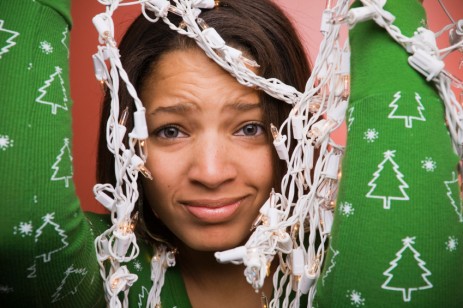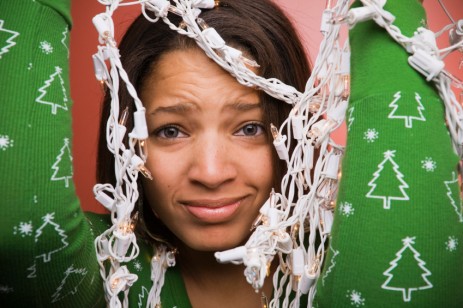Dearest Readers,
Now that I’m back from convoluted Copenhagen, I find I need a bit of a break. So I’ll be taking some time off to make gingerbread, sip cocoa, and knit myself a new compost bin, which means you won’t see my column next week. But I’ll be here on January 4 — look for me then (and don’t forget to find me on Twitter in the meantime). Happy Solstice, everyone, and thanks for another inspiring year!
Q. Dear Umbra,
Two questions for you this holiday season! First, the age old question regarding Christmas trees: real or fake? Second, what’s the most eco-friendly way to dispose of broken and burnt out strands of Christmas lights? Happy holidays!
Lisa V.
Seattle, Wash.
A. Dearest Lisa,
 Happy holidays to you too! The best option, of course, might be no tree at all, or decorating a live tree in your yard. But should you require an indoor display, a live tree is the way to go. I wrote a previous column on the live vs. artificial tree question which is, if you’ll forgive me, evergreen. My answer stands: Artificial trees are our second choice, because they almost always contain our foe PVC, and sometimes contain lead as well.
Happy holidays to you too! The best option, of course, might be no tree at all, or decorating a live tree in your yard. But should you require an indoor display, a live tree is the way to go. I wrote a previous column on the live vs. artificial tree question which is, if you’ll forgive me, evergreen. My answer stands: Artificial trees are our second choice, because they almost always contain our foe PVC, and sometimes contain lead as well.
Be aware, though, that conventional Christmas tree cultivation uses a crecheload of pesticides. If you’re buying a tree, try to find an organic one or one from a farm that uses Integrated Pest Management. Look, here’s a previous column on that as well! When Christmas is over, chop up and compost your tree, or grind it up to use as mulch.
As far as those pesky lights are concerned, I advise all of you to check with your municipalities to see if they have a recycling or takeback program. It may be that you simply have to put them in the trash. If you’re buying new ones, be sure to choose LEDs — they’ll last a lot longer than those old beat-up bulbs.
Twinkly,
Umbra
Q. Dear Umbra,
We live in an apartment in Brooklyn. We have a fire escape on which birds (sparrows) often rest. They also hang out on the windowsill. It’s nice watching them, but there’s a problem: they’re “pooping” on the fire escape and on the window ledges. This problem is even worse because one of the windows has a fan that we often use to blow air into the apartment; I’m concerned about sucking in air that has passed over their poop. What can we do to discourage these birds from pooping on our window ledges and fire escape? I don’t want to hurt them. Ideally, I’d like them to continue hanging out here, sans poop. But I imagine the only solution is to discourage them from hanging out here in the first place. What say you?
Joe N.
Brooklyn, N.Y.
A. Dearest Joe,
Are they partridges? Turtle doves? French hens? Oh wait, you said they are sparrows. There goes my attempt to make this an entirely holiday-themed column.
Your question reflects a fascinating combination of health, esthetics, and wildlife awareness. The unavoidable fact is, birds “poop” (I feel sure you can do away with your quote marks). Short of slipping them a great deal of Imodium to stop them up — and I am in no way endorsing this idea, so don’t yell at me, animal lovers — I think your choices are as you describe: to discourage them from landing in the first place, or learn to live with the poop.
There are various not-pleasant ways to keep birds away from ledges, ranging from spikes to netting to a terrible-sounding electric device with the wonderful name Bird-Shock Flex-Track. Cheaper, homemade suggestions that I’ve encountered include covering the ledge with tape and smearing petroleum jelly on it; procuring a plastic owl and repositioning it in your window from day to day; and banging on the glass. However, we all know that sparrows are persistent birds who have shown this country they’ll do as they please. So these methods might be pointless.
Which leaves us with the poop. Some people swear that a clean ledge is less encouraging to birds than one that’s already been pooped on. So you might consider cleaning up a bit, if it’s practical. Another wonderfully named product, which I cannot endorse but can happily point you to, is PoopOff. It claims to be all-natural, non-toxic, and biodegradable, though we know such eco-claims can be slung around carelessly. I believe good old-fashioned water and elbow grease could also do the trick. Either way, you should be sure to wear a mask and gloves.
Because, as you suggest in your note, bird droppings can contain bacteria that you don’t want to inhale. Should you be worried about your window fan? Well, yes and no. It’s gross, but if that’s the worst thing your fetid Brooklyn air contains in the summer, I would think you’re doing pretty well.
Tweetily,
Umbra
P.S. Speaking of tweeting, be sure to follow me on Twitter!
Q. Dear Umbra,
I try not to buy plastic and instead use recyclable aluminum foil, but the cheap aluminum foil often breaks down and leaves shards of foil on my food. Sometimes, I don’t pick off the shards and just, for example, eat a piece of lasagna with the tiny pieces of foil stuck to it. Could this be harmful? I have read about aluminum having bad links when it’s in antiperspirant and other products. Should I be concerned about this cheap foil leaving its bits on my food?
Johanna W.
El Paso, Tex.
A. Dearest Johanna,
Heavens, you must be in quite a rush, what with not having time to pick the foil off your food. My first recommendation to you, at the holidays and all the time, is simply to slow down. A few moments of foil-picking could prove a lovely form of meditation.
My second recommendation is to avoid using both plastic wrap and aluminum foil. It is nice that we have recyclable options for these modern conveniences, and I do commend you for shopping carefully, but they are still ultimately disposable items. Try to invest in more sturdy, permanent containers in which to store your leftovers.
That said, if you continue to knowingly or accidentally ingest foil, you shouldn’t worry too much. Aluminum is indeed a toxic metal, and murmurs of its links to Alzheimer’s, although not completely proven, do keep circulating. The truth is, you ingest aluminum all the time, through eating, drinking, and breathing — the stuff is everywhere, and a little extra bit in your teeth is not going to make or break your future health.
Conspiratorially,
Umbra


